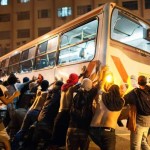
Brazilian Revolt: An Interview with Giuseppe Cocco
We can start by saying that what characterizes these protests is that they represent exactly nothing, while, for a longer or shorter time, they express and constitute everything. They have an untimely dynamic, fleeing from any model of political organization (not only the old political parties and unions, but also from the third sector, NGOs) and affirming a radical democracy articulated between networks and the streets: self-convoking and debating in social networks, massive participation in street protests, capacity and determination to confront repression, and even the capacity to construct and self-manage urban spaces, such as what happened in Tahrir Square, the Spanish encampments, the Occupy Wall Street attempts, and, finally, Taksim Square in Istanbul.
 Viewpoint Magazine
Viewpoint Magazine